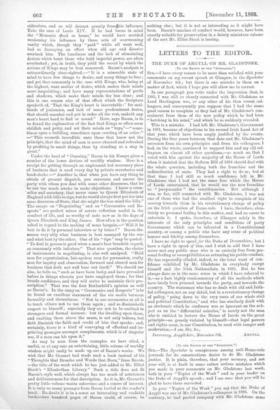LETTERS TO THE EDITOR.
THE DUKE OF ARGYLL ON MR. GLADSTONE.
[TO THE EDITOR OF THE " SPEOTATOR."]
SIR,—I have every reason to be more than satisfied with your comments on my recent speech at Glasgow, in the Spectator of November 4th ; but there is one mistake in them on a matter of fact, which I hope you will allow me to correct.
In one paragraph you write under the impression that, in 1885, I was still as closely connected with Mr. Gladstone as Lord Hartington was, or any other of his then recent col- leagues, and consequently you suppose that I had the same good reason to complain as they had of Mr. Gladstone's con- cealment from them of the new policy which he had been "hatching in his mind," and which he so suddenly revealed.
This is a mistake. I had left Mr. Gladstone's Government in 1881, because of objections to his second Irish Land Act of that year, which have been amply justified by the events.
During the four years between that date and Mr. Gladstone's secession from his own principles and from his colleagues, I had, on the whole, continued to support him and my old col- leagues on almost all other questions,—so much so, that I voted with him against the majority of the House of Lords when it insisted that the Reform Bill of 1884 should deal with the whole question, including both the franchise and the redistribution of seats. They had a right to do so; but at that time I had still so much confidenc? left in Mr. Gladstone that I had not the same fear which the House of Lords entertained, that he would use the new franchise to " jerryniander " the constituencies. But although I was, so far, still connected with Mr. Gladstone, I was not one of those who had the smallest right to complain of his secrecy towards them in his revolutionary change of policy on the Irish question of Home-rule. I have, therefore, abso- lutely no personal feeling in this matter, and had no cause to- entertain it. I spoke, therefore, at Glasgow solely in the interests of the only principles and conditions of party Government which can be tolerated in a Constitutional country, or among a public who have any sense of political honour and fidelity among themselves.
I have no right to speak for the Duke of Devonshire; but I have a right to speak of him, and I wish to add that I have never met any public man who is so entirely free from per- sonal feeling or susceptibilities as actuating his public conduct. He has repeatedly alluded, indeed, to the total want of con- fidence exhibited by Mr. Gladstone in everybody except himself and the Irish Nationalists, in 1885. But he has always done so in the same sense in which I have referred to it,—as a fact highly condemnatory of all the methods which have lately been pursued towards the party, and towards the country. The statesman who has so dealt with old and faith- ful colleagues, not on any detail, but in a revolutionary change of policy, "going down to the very roots of our whole civil and political Constitution," and who has similarly dealt with an electorate which he confesses was as ignorant on the sub- ject as on the "differential calculus," is surely not the man who is entitled to lecture the House of Lords on the great principle—so grossly violated by himself—that legal powers and rights must, in our Constitution, be used with temper and moderation.—I am, Sir, &c., inveraray, Argyllshire, November 7th. ARGYLL.






































 Previous page
Previous page